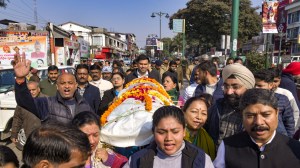Talking terms
The release of three Hurriyat leaders is as surprising as it is welcome. Until Syed Ali Shah Geelani, Abdul Ghani Bhat and Maulvi Abbas An...

The release of three Hurriyat leaders is as surprising as it is welcome. Until Syed Ali Shah Geelani, Abdul Ghani Bhat and Maulvi Abbas Ansari were freed from Jodhpur jail and brought to New Delhi they are still prohibited from going to the Valley, there was no hint of preparatory talks with them, no indication that still unspecified charges against them had been dropped. Still, the release is a welcome sign that the quest for political answers in Jammu and Kashmir may at long last have begun. A couple of days later Home Minister L.K. Advani asserted that the government was prepared to talk to Kashmiri militants. What more is to follow is not known. These two dramatic developments could amount to a public relations exercise or they could be the beginning of serious rethinking on Kashmir strategy.
New thinking is essential, as was obvious long before the massacre at Chattisinghpura and the series of events linked to it which revealed a disturbing level of unrest among the population. It has long been clear that the government8217;s efforts were too narrowly focussed on combatting cross-border terrorists and denouncing Pakistan8217;s support to them. What has been ignored and what the Farooq Abdullah government proved patently incapable of mitigating was the inevitable impact on the local population of stepped-up security operations to counter the new wave of terrorist violence in the aftermath of Kargil, a major feature of which was suicide assaults on key security establishments. Civilians have felt the fallout of these anti-terrorist operations in various ways not excluding further restrictions on their daily lives. Had the authorities been more sensitive to these issues, recent public demonstrations could have been handled far better, if not avoided altogether.
Two more serious mistakes are waiting to happen. One would be to treat the Hurriyat leaders as lighting rods. Something is certainly required to quell public anger over the recent events including the killing of demonstrators. But that something should not be an immediate political solution. The second mistake is to engage with the Hurriyat and the 8220;local ultras8221; Advani refers to without a clear idea of the endgame.
A credible interpretation of the latest moves is that they are designed to isolate Pakistan. With Farooq Abdullah8217;s apparent acquiescence, there is a softening of the line on the Hurriyat but the same unyielding posture on talks with Pakistan. However, Hurriyat leaders are calling for tripartite talks, a sensible stance given that no durable peace is possible without Pakistan. An internal political arrangement, meaning a degree of autonomy for Jammu and Kashmir which is feasible and meets with wide popular support, should be sought. Alongside is required an overarching settlement for peace and stability reached through talks with Pakistan.
- 01
- 02
- 03
- 04
- 05































